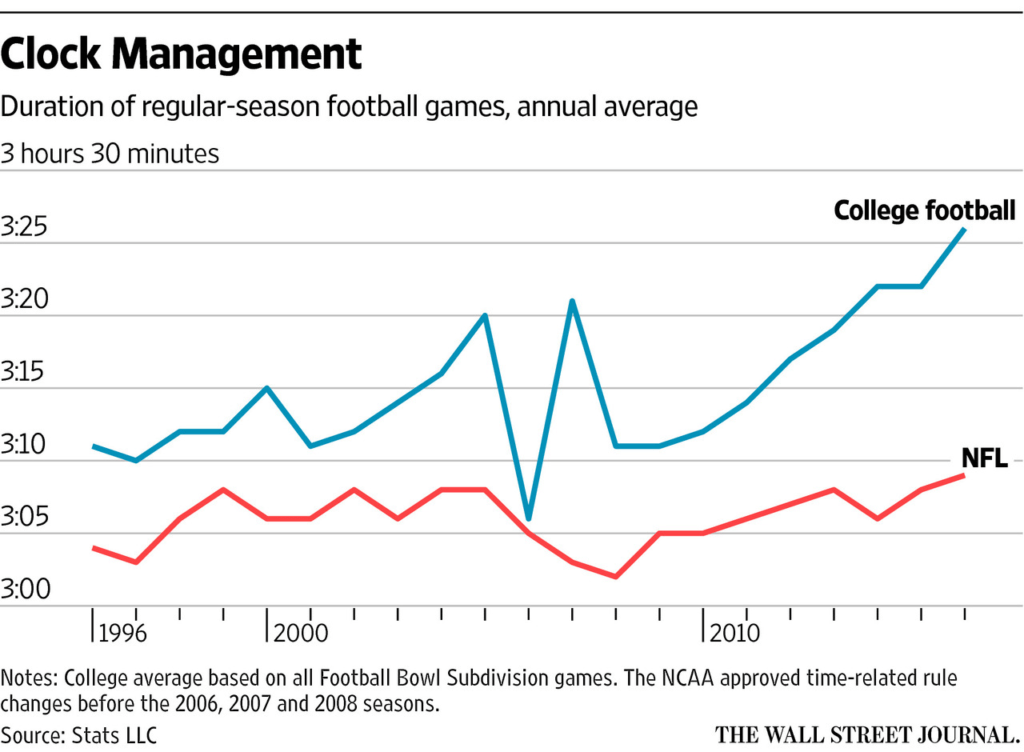Truth be told, How Long Is a College Football Game is a question that even the most die-hard fans often ask. Americans are obsessed with college football because we love all sports.
Whether you are in the stadium or watching at home, there is an almost tangible feeling of excitement and anticipation about college football games.
In this blog post, we explore the length and structure of college football games, contributing factors to game lengths, and fan experiences with how long they feel a typical FBS game lasts.
We’ll also address concerns about commercial timeouts being too frequent or prolonged while looking at recent changes implemented.
Let’s get started!
Overview of a College Football Game
College football traces its origins back to the late 19th century. Sporty, quite different from rugby and soccer (which is what it began as) but soon took the turn for the weird.
College football, which began as a conscript of the stable elite school spirit schools in our native land has grown exponentially to become recognized by many mainstream Americans as a part of their sports lexicon.
In the modern day, college football games are made into a huge spectacle with large crowds coming to see these games in person and of course nationally televised.
Importance in American Culture

It’s not just football, it’s college football and part of the American experience. Schools and hamlets will band around their sports teams creating a sacred ground of unity!
Game days are one of the most highly anticipated annual events for many students, alumni and local residents.
Things like tailgating, the bands and chants give college football what some see as something extra making it a unique brand of thing to experience.
How Long Is a College Football Game: Standard Duration

Regulation Time
The standard length of a college football match consists of 4 quarters, with each one stretching over 15 minutes.
Therefore, the original 45 minutes are played repeatedly and added to other for extra time of any solution in Overtime. This brings a total regulation time metering at 60 minutes.
But this is scratching the surface of comprehending how long the game actually runs.
All those 60 minutes can last quite a bit longer when the clock stops often, and for far too many reasons.
Halftime
In college football, halftime is 20 minutes. During this break, the fans are entertained by marching bands, cheerleading squads and other activities.
A halftime is not more than a rest for the players, even a band show at break etc. like that are part of entertainment and we enjoy it with full elation.
Factors Extending Game Duration
Play Clock and Game Clock Stoppages
Many things could prolong the duration of a college football game, it is not limited to one thing. One is stoppages on the play clock and game clock.
These are unlocked on incomplete passes, plays that run out of bounds or penalties. Each one of these stoppages adds up time to the game, which contributes to its long real-time span.
Timeouts
Each team has 3 timeouts per half. These timeouts, as every coach will tell you of its crucial importance in regrouping and planning plays or clock management. Also, TV timeouts for commercial breaks are scheduled throughout the game as well.
These breaks allow broadcasters to air commercials and make the game even longer.
Injuries
Time taken with player injuries During any injury timeout, medical staff must immediately attend to the injured player either on-field (player is attended by trainers) or off-field.
This can add minutes or much longer to the overall play time of a game, depending on severity.
Overtime
Because, if when the game ends it is still a draw and overtime would determine this. In College football, they give each team a chance to get the ball starting at the opponent’s 25-yard line.
More than one is uncommon and can drag the game on quite a bit.
Average Real-Time Duration
Typical Game Length
Although the official time is 60 for college football, most games last much longer. Each college football game typically lasts 3 to 3.5 hours on average.
And that accounts for all of the stoppages, timeouts and halftime hijinks while also factoring in any potential overtime.
Comparisons
College football games are often longer than other sporting events.
For example, NFL games are of a similar structure but tend to be shorter because there are fewer stoppages and the halftime is cut down.
College Football games are just downright long, especially in comparison to other sports like basketball or soccer where there are not many times throughout the game that a fan could go and grill up some hot dogs at halftime.
Viewer Experience
Fan Engagement
The best viewer experience in college sports is, of course, football. It is a known fact that tailgating and pre-game activities are standard tradition as well so fans can surround themselves in the festivity hours before game time.
In-stadium experiences include live game day play, cheers in the stands, and halftime entertainment.
Television Broadcast
Television broadcasts have engaging features of their own for those watching at home. Commercials, even if elongated, the game itself does act as breaks for TV viewers.
This commentary and analysis during the breaks bring depth to watching, by helping fans understand more intricacies of the game.
Recent Changes and Innovations
Rule Changes
Of course, the league has implemented numerous rule changes over the past few years in an effort to speed up play.
However, these get a wide range of form with proceedings such as changes to the play clock but chief stoppage times too and how penalties are enforced.
But the point behind those changes is to make pro ball more interesting and viewer-friendly, while continuing to respect its tradition.
Technological Advancements
Advancements in technology have also led to longer college football game times. The instant replay reviews add some time, but they help make sure that all decisions are based on the fact of what happened.
Better broadcasting technology has also sped things up by a few seconds, which helps keep the game moving and reduces some of those long, unnecessary television timeouts.
Conclusion
There is more to it than just the regulation time when you think of how long a college football game takes.
The length of the game is easily extended by other factors, such as clock stoppages (like team calling time out) or needing to reset after injury etc., and it can be upwards of 3 hours.
College football may be drawn out, but the excitement for each of its games guarantees it being a few hours well-spent.
Either at the stadium or on television, fans can enjoy their experience better if they know what to expect.



